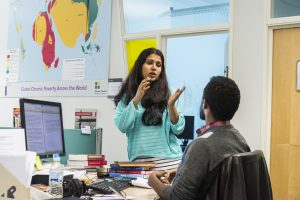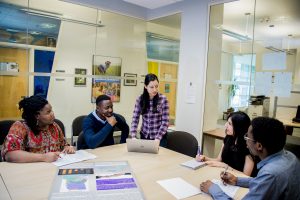By Judith Krauss, post-doctoral associate at the Rory and Elizabeth Brooks Doctoral College
How do you best combat the jitters of starting a PhD? With over a dozen new PhD researchers joining the Rory and Elizabeth Brooks Doctoral College at the University of Manchester’s Global Development Institute, we called upon our existing PhD researchers to ease our new arrivals’ transition.
The formidable panel of Corinna Braun-Munzinger, Sally Cawood, Connie Kang, Lina Khraise, Virgi Sari, Ryo Seo-Zindy, Gaby Zapata Roman, Dani Malerba, Robbie Watt and Bala Yusuf kindly shared their much appreciated insights on the Do’s and Don’ts for the PhD journey.
Make sure you have a life to balance your work from the beginning. The PhD is a new step – unlike previous higher education, there are only a limited number of classes to attend, and most of the work will be self-directed. Consequently, it is easy to fall into unhealthy patterns of working long hours, which can become unproductive. As a result, taking breaks, distancing yourself from work, having friends who have no idea what a conceptual framework is (and frankly don’t care) is vital. But find your own path – you know best what can help you relax, and what can help you work more productively.
Whatever you do, share your thoughts and struggles – whatever you may be feeling, someone else will have felt it before you. Hopefully, that will help you avoid the fates of two of our PhD researchers: one lost all his hair in the first PhD year, and the other realised at one point that she had not talked to her husband for a week!
Data collection
Stay level-headed: it is absolutely normal if things do not go according to plan. As a result make sure you have enough flexibility to deal with inevitable delays, limited access to databases/interviewees, and take advantage of the unexpected opportunities which present themselves.
There is a fine line between making sure you answer your research questions, but also being responsive enough to seize unexpected opportunities. In all likelihood, you will have far more data than you need to write a PhD – the question then simply becomes: which PhD do you want to write?
There are likely to be opportunities to teach, support other research projects and reach out to the community through public engagement in the course of your PhD. Be selective. What you choose to take advantage of should also depend on what you aspire to do after the PhD, helping you develop skills extending beyond your PhD research (teaching, editing, publishing, conference organising, blogging, etc). Make sure your supervisors and other academics are aware of your preferences so they can let you know about suitable opportunities.
Working with supervisors
A PhD is not so different from project management– you have to realise that a PhD is your project, you are managing it, and you are calling upon the help of two trusted consultants (ie your supervisors) when you need their input.
There is a fundamental incongruence: whereas the PhD will be almost your sole focus, supervisors will have a myriad research, teaching, administrative, supervisory, etc, responsibilities. Make sure that you use your time with them well, go into meetings with a clear idea of what you need, and also respect their other responsibilities by not sending them a chapter to read one hour before your supervisory meeting. You need high-quality supervision for guidance, but ultimately, it is your PhD, and you have to write it: you cannot sit in your PhD defence and explain that you only did this because your supervisor told you to. This also means you may have to disagree with your supervisors occasionally. But remember, your supervisors want you to succeed!
Your PhD colleagues are your friends, in more ways than one. They can offer immediate help on things like literature to read or software to use, and most importantly, they will understand the ups and downs of a PhD better than anyone else. Make sure you reach out to PhD candidates outside of your own discipline as well. Everyone will struggle at some point –it is important to share those experiences, and to keep an eye on each other.
Finally, never compare yourself against others’ achievements. Each PhD journey is different.
The PhD experience
While the PhD journey can be trying, it is also important to appreciate it as a privilege: few have the opportunity to spend several years reading, writing and thinking about a topic they have chosen themselves.
Make sure you enjoy it!



